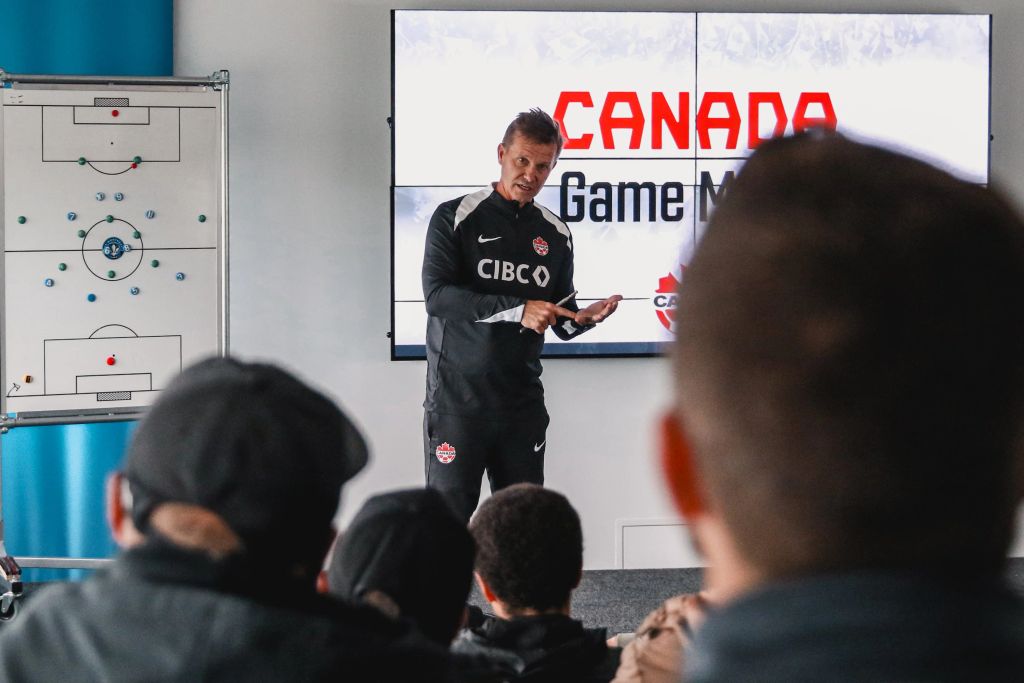CanMNT head coach Jesse Marsch takes pursuit of excellence on tour in Halifax

Canadian Men’s National Team head coach Jesse Marsch walked through the automated doors at the Future Inns Hotel in Halifax, his chin tucked into his jacket and Tuesday’s winter chill falling off him like a cloak. It was, he told reporters moments later, stamping his feet, his first visit to Canada’s East Coast and reminded him of the snow-spangled winters of his childhood spent in Wisconsin.
It was also his first stop on a whirlwind coast-to-coast spree of coaching workshops that spans from Halifax, which took place on January 21, and wraps in Vancouver on January 29: six Canadian cities, eight days and hundreds of football coaches eager to learn from the national program.
But, by his own admission, Marsch is not out to preach.
“I’m sharing what we’ve done with the national team,” he told gathered media. “I’m not trying to force anything down anyone’s throat. I just want to see if we can continue to find ways to bring the football community in Canada together in the right way.”
His words are one thing — similar to those echoed by other Canada Soccer representatives before — but it’s Marsch’s actions which have caught the attention of football communities like Halifax.
“In the 10-years I’ve been involved with Soccer Nova Scotia, we haven’t had the national men’s team coach here in the Atlantic provinces. I think it’s really exciting for local coaches to be given that opportunity to hear from the national team head coach and hear his tactics and potentially scale them for local programming,” said Lindsay MacAskill, executive director of Soccer Nova Scotia.
“As a small and mighty province, with the Atlantic provinces as a whole, we are always asking Canada Soccer to help provide additional resources and visits. Hopefully, this is the first of many.”
Grassroots work to make the dream work
It’s been less than a year since Marsch was officially announced by Canada Soccer but he said he’s come to understand a lot about the country and its football over that time.
One of the things, he noted, is that despite the differences in geography, the Canadian football landscape is not isolated or siloed off. There’s a cross pollination of ideas happening, of pride in the athletes coming out of programs from Toronto or Vancouver, and he said he hopes to foster that mentality.

Marsch also said that growing the grassroots game, exemplified by his coaching workshops, is part of ensuring a strong and balanced national program and connecting communities.
“I think they’re mutually inclusive. I think that building the game (locally) is essential for the national team and certainly I think we need to build a more robust youth national team program for our men’s and women’s teams,” he said.
“I know, in the end, people are going to love me or hate me based on how the team does in the 2026 World Cup. But along the way, I take this (grassroots) responsibility very seriously. This is different from coaching a club team. I have a responsibility to the nation to try and do the best I can in every possible way to help the sport and I’m committed to do that.”
Again, it’s one thing to pay lip service to growing the sport. However, be it hosting a camp in Montréal or chatting with the nearly 80 coaches in Halifax, Marsch is showing that he’s taking a hands-on approach for the long-term.
MacAskill said the mentality of Canada Soccer’s new representatives is evident.
“It’s really good to see their coaching staff do the cross Canada tour and really make you part of something that’s bigger. It shows the evolution and leadership of Canada Soccer,” she said.
Touring around Halifax, Nova Scotia
Traveling for the coaching workshops is also providing Marsch with an opportunity to familiarize himself with local communities and to make connections.
For example, when he arrived at the hotel on Tuesday, he was flanked by Halifax Wanderers head coach Patrice Gheisar, who had previously been invited to the national team camp back in December.
Marsch said he’s taken the opportunity to talk with Gheisar about the city, Halifax’s players and even took a trip to the Wanderers Grounds, where the municipality is weighing the idea of building a permanent $40-million stadium.
“He took me over to the stadium,” said Marsch. “I think, you know, he did it with a little nudge implied.”

And he said he understands the symbolism of taking the national team on the road to a place like Halifax, something Marsch’s noted in previous interviews. Playing at the Wanderers Grounds is definitely not out of the question.
“That would be an important gesture the national team could make and I’m not sure if we’re ready to do that yet but it’s been talked about internally. I can say that, for sure,” said Marsch.
And it’s important for Marsch, and the recently hired Canadian Women’s National Team head coach, Casey Stoney, to interact with all levels of the country’s football pyramid. Speaking with Gheisar, and other coaches across Canada, is part of the process of understanding the rungs below the national programs.
The endless pursuit of excellence
Suburban FC’s sporting director, Oliver Hewish, is looking to help his club grow.
Based in Halifax’s suburbia, the club has grown alongside Nova Scotia’s burgeoning figures; since 2019, registrations have risen by 4,000 players, with some 25,000 registered through Soccer Nova Scotia this past summer.
And as registrations continue to climb, so too Suburban’s ambitions as a club.
“We want to be more than a community (football) club,” said Hewish. “There’s no reason we can’t end up in a League 1 scheme.”

Oliver Hewish (middle) of Suburban FC.
League1 Atlantic is still very much a work in progress but Marsch’s workshop, which Hewish attended, is the type of presentation he explained helps set the standard for the local community.
“We’re going to a World Cup and we need to have a pursuit of excellence. Jesse presented his plan and his ideas and how we’ll pursue excellence as a country — not just as a national team but as a country as a whole — and I think the mix of people was awesome. It was another opportunity to show everyone this is the demands of the game,” said Hewish.
“The main (take away) is probably just seeing the desire from a national team head coach.”
Marsch emphasized in his visit he isn’t looking to force his ideologies on anyone.
But it’s clear that his work ethic and beliefs are being seen by those outside the national team dressing room. And standing in Halifax on a chilly winter night, Marsch shared the kind of connections he’s creating, one training session or workshop at a time.
“I know everybody (in Nova Scotia) is really proud of Jacob Shaffelburg. He was texting me today: ‘Welcome to the best province in Canada,’” shared Marsch, smiling. “I’m excited, I’m excited to be here.”

